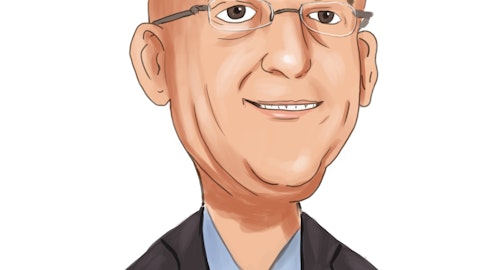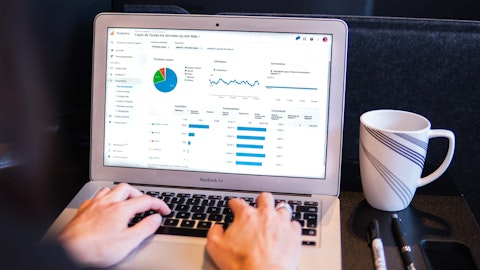Kulicke and Soffa Industries, Inc. (NASDAQ:KLIC) Q1 2023 Earnings Call Transcript February 2, 2023
Operator: Hello, and welcome to the Kulicke & Soffa 2023 First Quarter Results Conference Call and Webcast. A question-and-answer session will follow the formal presentation. As a reminder, this conference is being recorded. It’s now my pleasure to turn the call over to Joe Elgindy, Senior Director of Investor Relations. Please go ahead, Joe.
Joe Elgindy: Thank you. Welcome everyone, to Kulicke & Soffa’s fiscal first quarter 2023 conference call. Fusen Chen, President and Chief Executive Officer and Lester Wong, Chief Financial Officer are joining us on today’s call. Non-GAAP metrics will be referenced throughout today’s call. The non-GAAP financial measures should be considered in addition to, not as a substitute for or in isolation from, our GAAP financial information. Complete GAAP to non-GAAP reconciliation tables are available within our earnings release filed yesterday, as well as the earnings presentation, which may be found on the Investor Relations section of our website at investor.kns.com. In addition to historical statements, today’s remarks will contain statements relating to future events and our future results.
These statements are forward-looking statements within the meaning of the Private Securities Litigation Reform Act of 1995. Our actual results and financial condition may differ materially from what is indicated in those forward-looking statements. For a complete discussion of the risks associated with Kulicke & Soffa, that could affect our future results and financial condition, please refer to our recent SEC filings, specifically the 10-K for the year ended October 1, 2022, and the 8-K filed yesterday. With that said, I would now like to turn the call over to Fusen Chen for the business overview. Please go ahead, Fusen.
Fusen Chen: Thank you, Joe. Over the prior quarter we continued to execute on our development plans and the customer engagements supporting secular trends in the Automotive, Semiconductor and advanced display markets and also our tactical margin optimization and market share gain strategies within the higher volume wire bonding and also electronics assembly markets. I will discuss these specific opportunities in more details shortly. Over the same period, we have been monitoring and internally addressing the recent policy pivot on COVID within China. Over the last two months we experienced a rapid increase in internal COVID cases within our Suzhou facility. While this had little impact on our production capabilities during the quarters, this wave of COVID in China is broadly impacting the operational capacity of our customers within China.
We currently anticipate this effect creates additional capacity uncertainty and will have a slight impact on our near-term outlook, although it will likely support a quicker rebound as China GDP forecasts have recently improved. We also anticipate this policy shift dramatically reduces the potential for regional lockdowns — which have had both supply chain and demand implications for us over the prior years. In addition to the potential for a swifter macro recovery in China, the consumer electronics show, which took place last month helps to provide a glimpse into the future for existing and new applications such as electric vehicles, artificial intelligence, wearables and display technology. Our business continues to be very aligned with these long-term trends and we look forward to supporting them over the coming years.
Collectively, our longer-term industry outlook remains consistent. We currently anticipate semiconductor unit growth, excluding LED, will return to a more normal growth rate in calendar 2023, and nearly 10%-unit growth in calendar 2024. In addition to a more normal level of growth for the non-LED semiconductor market, LED units are expected to grow at a 19% CAGR, roughly 300 billion units of production annually through calendar 2025, in support of new mini and micro-LED applications. Also of note, our book-to-bill ratio exceeded one for the first time since June of 2021. While near-term inventory digestion and the macro improvements are necessary to support industry growth, these data points provide additional confidence to our outlook. Turning to the December results, we generated $176.2 million of revenue, and $0.37 of non-GAAP EPS, coming in ahead of our projections from last quarter.
Our total capital equipment revenue was $135.4 million in the December quarter, with the majority of softness stemming from General Semiconductor, as anticipated. While General Semiconductor is typically driven by capacity needs there are growing technology changes, which are providing additional strength. First, within our high-volume wire bonding market, assembly complexity continues to require more equipment capabilities. These capabilities allow us to enhance our margin profile. Lester will provide some additional information on our optimization focus shortly. The next is within the power semiconductor market, which is represented in General Semi and also our automotive and industrial end markets, continues to evolve with the growth in both traditional silicon and emerging compound semiconductor applications.
These power semiconductor trends have supported multiple record revenue quarters for wedge bonding in fiscal 2022, and allowed us to reach a new record revenue during the December quarter. In addition to our dominant, long-established position within the traditional wedge bonder market, we also address power and compound semiconductor needs capabilities, including clip attach, larger bonding areas and laser-assisted bonding approaches. Emerging compound semi devices using Gallium Nitride and Silicon Carbide, support fast-growing applications such as high-speed vehicle charging, 5G base stations, alternative energy and high-powered servers. We will provide additional updates on these emerging opportunities over the coming quarters. Additionally, we are pleased to report that we continue to see very strong demand for our robust thermocompression solutions, which support advanced-logic applications and are very aligned with emerging Chiplet trends.
Our efforts to engage with a broader group of fabless companies over recent quarters has been very beneficial and has positioned us for additional share gains in the logic market. At this point, we are increasingly optimistic on the future of thermocompression and are growing our engagements with key customers. Several new customers have requested systems, and although we remain very supply-chain limited over the near-term, our TCB team is working aggressively to support multiple customer engagements in parallel. Additionally, we have previously anticipated a 10-micron pitch limitation for TCB. We now see the potential to extend this technology to below a 10-micron pitch, which can materially expand the size and long-term potential of our competitive TCB portfolio.

Photo by Christian Wiediger on Unsplash
Finally regarding TCB, I’m pleased to report that we have received customer acceptance on our first fluxless chip-to-substrate TCB system, and have shipped our first fluxless chip-to-wafer TCB system. This will be followed by an additional system shipment to a leading foundry customer. As we highlighted over the past several calls, we continue to expect the majority of heterogeneous assembly needs can be addressed with our growing portfolio of TCB solutions. Moving to the LED market, we remain engaged and are supporting multiple customers with multiple advanced display solutions. We continue to make progress across several different initiatives in advanced display. I’m very pleased to highlight that we have recognized revenue of our first LUMINEX system.
Over the coming quarters, we intend on shipping additional systems and earning additional purchase orders for LUMINEX, which support backlighting applications and large-format, direct-emissive applications. Additionally, we have received interest to utilize this high-throughput system in more traditional semiconductor assembly markets in addition to the growing advanced display opportunity. By the end of fiscal 2023, we also expect to receive acceptance on the next phase of the customer-specific advanced display solution, which we will refer to as PROJECT W going forward. Demand for this system is expected to accelerate into fiscal 2024. Within Automotive, the ongoing electrification and autonomous transitions will continue to benefit our business over the long-term.
Power semiconductor and compound semi-trends are benefiting our automotive customers in addition to some general semiconductor customers. The consumer electronics show last month highlighted new electric vehicles from established and emerging automotive companies, which continue to drive innovation, bring down costs and broaden market adoption. We are currently preparing to launch our next battery bonder for larger-form factor using both ultrasonics and laser-interconnect solutions in addition to supporting the production ramp for vehicles and also for long-haul trucks. Memory remains soft over the near-term although we continue to anticipate a slight pickup in the second half. In addition to parallel customer engagements and development programs, we remain on track to close the pending dispense acquisition as planned.
As a reminder, this strategic acquisition provides additional access to adjacent-dispense opportunities in both semiconductor and electronics assembly. Collectively, these two areas represent a $2 billion addressable market and provide a new set of long-term opportunities. In addition to continuing on a prudent M&A path, we are also very focused on scaling our own equipment manufacturing capabilities further in fiscal 2023. During our prior fiscal year, we increased our capital equipment manufacturing footprint by 148,000 square feet, or 44% to 485,000 square feet and remain very focused to build out this footprint through 2023. Overall, despite persistent macro and regional challenges over the past few years, we have consistently execute and have fundamentally expanded our long-term opportunities.
There is no shortage of new opportunities and our global teams have remained very focused on supporting our customers by delivering new solutions and driving acceptance. While consumer-driven softness is anticipated to create an ongoing headwind for our high-volume product lines over the near-term. We remain very optimistic and continue to anticipate a seasonal recover in the second half followed by broader capacity and technology growth in fiscal 2024. With that said, I will now turn the call over to Lester who will discuss our financial performance and outlook, Lester?
Lester Wong: Thank you, Fusen. My remarks today will refer to GAAP results, unless noted. Outside of the recent and near-term expectations surrounding China’s COVID policy pivot, our broad-demand expectations for the year, remain largely unchanged from last quarter. Our efforts are focused on driving customer acceptance of our growing portfolio of solutions and growing our manufacturing and development capabilities with our ongoing capital expenditure programs. During the December quarter, we generated $176.2 million of revenue, 50.3% gross margin and $0.37 of non-GAAP EPS. Gross margins were better-than-expected due to cost control efforts, product and feature mix, supplier rebates and lower depreciation due to Capital expenditure shifts from December into the March Quarter.
As Fusen mentioned, we have taken a long-term and strategic view in optimizing the gross margins of our ball bonding business and remain focused on further enhancing our corporate gross margins over the long-term. Operating expenses came in slightly higher than anticipated, due to a foreign exchange loss. Finally, tax expense for the quarter came in at $3.8 million due to a higher mix of interest income in addition to the mandatory capitalization of R&D expenses under section 174, which began in our fiscal 2023 year. We anticipate maintaining a similar effective tax rate throughout the current fiscal year. Turning to the balance sheet, working capital days increased to 536 days in the December quarter, primarily due to a sequential reduction in revenue.
In addition, net cash increased by $48 million, and inventory increased by $27 million sequentially to support our longer-lead time products over the coming quarters. We continued to deploy capital to shareholders via our opportunistic repurchase program, as well as our recently increased quarterly dividend payments. During the December quarter we deployed $45.4 million to repurchase just over 1 million shares. Looking ahead to the March quarter we anticipate revenue of approximately $170 million with gross margins of 46%. Gross margins are anticipated to gradually improve to a blended 47% for the fiscal year as we continue to ramp our capital expenditure programs. Non-GAAP operating expenses are anticipated to be approximately $68 million plus or minus 2%, due to ongoing expansion efforts, employee merit increases and inflation.
We remain very focused on controlling and limiting any non-critical activities and have recently initiated a hiring freeze and placed limitations on non-essential travel and non-critical project expenses. Non-GAAP net income is expected to be approximately $14 million with non-GAAP earnings per share of approximately $0.25. It remains an exciting time at K&S as we continue to execute and increase our participation across several long-term fundamental trends within the semiconductor, advanced display, electronics assembly, and automotive markets. As we look into 2024, we remain optimistic on broader macro demand trends and remain extremely focused to support the technology needs of our customers. This concludes our prepared comments. Operator, please open the call for questions.
See also 12 Best Dividend Growth Stocks with 10+% Increases and 30 Most Famous Yale Students of All Time .
Q&A Session
Follow Kulicke & Soffa Industries Inc (NASDAQ:KLIC)
Follow Kulicke & Soffa Industries Inc (NASDAQ:KLIC)
Receive real-time insider trading and news alerts
Operator: Certainly, we’ll now be conducting a question-and-answer session. Our first question today is coming from Krish Sankar from Cowen. Your line is now live.
Krish Sankar: Yes. Hi, thanks for taking my question. I had a couple of them. Number one Fusen or Lester in the past you mentioned FY €˜23 could be roughly around $900 million in revenues. Can you underwrite that revenue expectation? And do you think March quarter is a trough from a quarterly standpoint?
Fusen Chen: Okay. Actually, Krish see more precisely, I think the last cycle pick was a 2018 revenue $890 million. So that was the number you just mentioned and the current consensus for FY €˜23 revenue is at $840 million average of all the analyst. So there’s a little bit change. Last December COVID situation in China created actually some additional softness in our FY €˜23, but you know same time same quarter we see our book to bill ratio over 1.0 and which point to potential trough in FY Q2. So, at this moment, we expect our second half will be better than the first half. So, overall, I think that at this moment we are comfortable at the consensus revenue of $840 million, due to China COVID situation that really have some softness in our ’23, but it could impact us in Q2, and we expect maybe extend a little bit longer into Q3. So that’s my answer.
Krish Sankar: Got it, got it. No, that’s very helpful, Fusen. And then I just had two other questions. On the book-to-bill improvement, I understand you’re coming off a lower revenue base, but is that order improvement driven by one specific customer, one specific product or was it across the board. And then I have a follow-up for Lester.
Lester Wong: So the book-to-bill for the last couple of quarters have been about 0.8 right, now it’s gone up to about 1.3, and I think it’s a lot of our backlog actually is in ball bonder and most of it will be recognized within FY €˜23, close to 60% of it will be recognized FY €˜23. So it’s not one specific customer, It is ball bonder, it’s also advanced packaging and also wedge bonder. So I think the backlog is across several business units.
Krish Sankar: Got it. Got it. And then, Lester just a quick follow-up. The days of inventory and the inventory days payables both are pretty high. So I’m kind of curious what’s going on, is it just purely wire bonders that’s kind of been accumulated or what’s going on with that high number relative to the past. And what is your lead time today for wire bonders? Thank you.
Lester Wong: So the lead time today for wire bonders is about, for ball bonder is about eight to 12 weeks, for wedge bonder is about 16-weeks. As far as inventory is concerned, some of it is result of, again because of supply chain issues in the past, we actually bought a lot of items to make sure that we will not be short and we have no supply chain issue going forward. Plus we also increased inventory, because we actually did also buy some long lead items for POs that we see that’s falling into the latter part of €˜23 and the beginning of €˜24 for example in advanced packaging as well as in wedge bonding.
Krish Sankar: Thanks a lot Lester. Thanks, Fusen.
Fusen Chen: Yes. Thank you, Krish.
Operator: Thank you. Our next question is coming from Craig Ellis from B. Riley, your line is now live.
Craig Ellis: Yes, thanks for taking the questions and all the color so far, guys. So I wanted to follow-up on a few of Krish’s points so. Lester, can you provide some additional color on order improvement. You gave us a good sense by products, but can you talk about what the order activity looked like on OSATs versus OEMs. And then any color on end markets would be helpful as well.
Lester Wong: Craig, you mean for Q1?
Craig Ellis: Yes.





